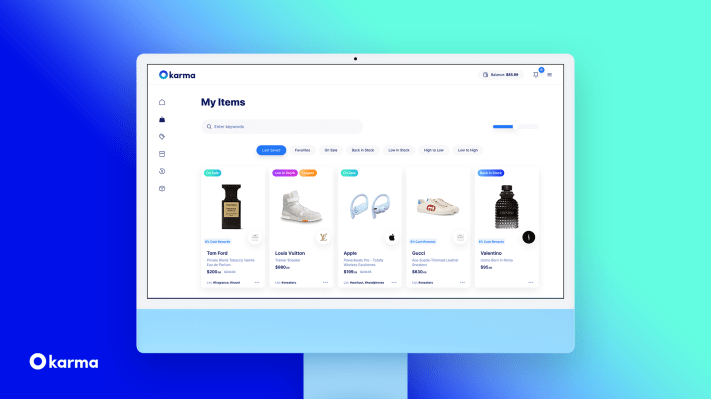AI shopping assistant and shopping network Karma announced that it has raised $25 million in Series A funding led by Target Global followed by MoreTech Ventures, with participation from existing investors including NFX and Altair Capital. Karma allows users to plan their next online purchases, get notified about real-time price and inventory updates, access coupons and earn automatic cashback.
The Tel Aviv-based company was founded in 2014 by Jonathan Friedman and Ronen Yuval-Hoch as a simple bookmarklet tool to help consumers save and track products. Since then, Karma has launched browser extensions, along with iOS and Android apps. The company now employs nearly 60 people across Tel Aviv, Minsk, Belarus and the U.S., and has grown to include over 30,000 retail partners, such as Apple, Nordstrom, Farefetch, Target and Nike.
“Karma started with a very simple need: just knowing when something goes on sale in your size and color in real time,” Jonathan Friedman, Karma CEO and co-founder, told TechCrunch in an interview. “The idea is originally from my wife. She came to us one day and said: why isn’t this process automated? We started from there, basically just knowing when there’s a price change and automating that for the user,” he said.
Today, Karma has three core functions. Firstly, the service allows users to create shopping lists where they can save a product for later in one universal cart. In the background, Karma will automatically notify the user if there’s a price change or if something comes back in stock. This function is focused on helping users to streamline and plan their purchases in one location.
Secondly, the service automatically searches the web for coupons at checkout, which is similar to the premise of PayPal’s Honey service. When asked how Karma compares to Honey, Friedman stated that although Karma does have an automatic coupon-finder like Honey, this feature is just one aspect of Karma’s offerings. He said Karma is different than Honey because it takes users on the complete pre-purchasing journey and aggregates relevant services all in one place, while also surfacing coupons. However, PayPal’s interest in Honey is also about capturing users ahead of purchase these days. Its integration into the PayPal app sees the fintech company targeting shoppers with personalized deals.
Friedman also outlined that Karma’s third core function allows users to automatically earn cash back at hundreds of retailers. Karma surfaces all of the relevant cashback offers that users are eligible for at checkout.

Image Credits: Karma
“All three of these functions aim to help you automate a lot of the pre-purchasing journey and save time and money. We always want to try to provide users with the best value, but it’s very important for us to streamline the experience,” Friedman said. “Today, you need a lot of different apps for different things like coupons or cash back, but we offer all of that in one ecosystem,” he noted.
With this latest round of funding, Friedman says Karma will focus on doubling the size of its team within the next year. The company also plans to add more features to the tool in the future and continue to heavily invest in AI and machine learning. Additionally, Karma will focus on finding ways to grow its userbase.
Karma currently has around three million customers and around 650,000 monthly active users. Its userbase has been growing between 15% to 20% month-over-month, and Karma users have saved a total of over $144 million so far this year.
“The vast majority of our customers are millennials, followed by Gen Z. I think it’s important to point out that we do not attract the typical coupon-hunters, that’s not our audience, Friedman stated. “Our audience is a high-quality shopping audience because if you look at the average order value across our merchant partners, the average order value is over $100. We are extremely strong in the higher end, so we do not attract the typical coupon audience at all. We attract an audience that wants to shop smarter or wants to automate a big part of the shopping journey. Obviously, no one wants to overpay so we also want to make sure that you never pay more than you should,” he added.
As for the future, Friedman said Karma is not only focused on the pre-purchasing journey for its users but is also looking at moving into point of sale and post-purchase strategies, as well.
Essentially, Karma is “creating the biggest shopping network in the world,” he believes, and it can become the market leader in automating the shopping experience. He noted that the company plans to improve users’ shopping journeys by launching additional services and features, some of which are scheduled to launch by the end of the year.
